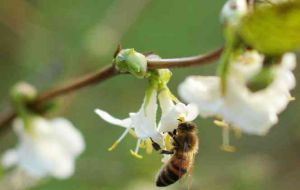MercoPress. South Atlantic News Agency
Europe short of bees to pollinate crops, warns report from Reading university
 Europe as a whole has two-thirds of the honeybees it needs for pollination, according to the report from Dr. Breeze
Europe as a whole has two-thirds of the honeybees it needs for pollination, according to the report from Dr. Breeze Europe needs an extra seven billion bees to pollinate its crops, with Britain in the poor position of having less than a quarter of the honeybees it requires. The demand for insect pollination across Europe is outpacing the growth of honeybee colonies as farmers grow more oil-bearing crops like oilseed rape and sunflowers, and also fruit.
Researchers at the University of Reading said agriculture is increasingly reliant upon wild pollinators such as bumblebees, solitary bees and hoverflies for these crops.
They said the European Union’s bio-fuel policy, which encourages the growing of these oil-bearing crops, is making Europe more reliant upon these wild pollinators.
“If these wild bee populations collapse there would be nothing to compensate for them,” Dr Tom Breeze form University of Reading said. Dr. Breeze, who conducted the research, warned that Europe lacks coherent policies to protect these wild insects’ habitats.
“If these wild bee populations collapse there would be nothing to compensate for them,” Dr Breeze was quoted by Farmers Weekly.
He suggested an increase in honeybees would offer more insurance for pollination, while farmers could encourage wild pollinators by leaving wild flower margins around their fields.
Dr Breeze said there is less than 25% of the honeybees we need in Britain for pollination, and there is little data on how good wild insects are at pollination. This led him to suggest that oilseed rape yields might not be as high as they could be in Britain if honeybee numbers were much higher.
Europe as a whole has two-thirds of the honeybees it needs for pollination with a deficit of more than 13.4m colonies, or the equivalent or about 7 billion bees.
The university conducted its work between 2005 and 2010 across 41 European countries when there was a big growth in oilseed crops for use in products like bio-diesel.
In this period, European beehive colonies increased about 8% helped by rises in countries such as Turkey, but the demand for insect pollination grew five times as fast.
However, British bee colonies declined by about 5% during 2005-2010 continuing a population fall that has been seen since the 1980s.
Only Moldova, one of Europe’s poorest countries, has a bigger honeybee deficit than Britain, while Slovenia and Norway, with strong beekeeping traditions and restricted arable land, were the best for honeybee numbers.
The work, published in the US journal, 'Public Library of Science One', concluded that more than half of the 41 European countries including Britain, France, Germany and Italy did not have enough honeybees to pollinate properly the crops grown.
Further research at the university published last month showed that wild pollinators such as bumblebees and solitary bees are just as effective pollinators of oilseed rape as honeybees.
The research team also concluded that insect pollinators added £37m a year to the value of just two varieties of British apples, Gala and Cox, by increasing fruit yield and quality.
The EU introduced a ban on neonicotinoid insecticides, used in seed treatment for crops like oilseed rape, at the start of last month in an attempt to improve the health of bees.




Top Comments
Disclaimer & comment rules-

-

-

Read all commentsLeaving the problem of insecticide sprays apart,one theory attributes the bee decline to the ubiquitous use of mobile phones whose signals upset the bees instinctive navigational ability.
Jan 10th, 2014 - 03:28 pm 0Bees don't like static electricity. The old timer who taught me said, first never site your hives anywhere near a high voltage power line. They produce little and are aggressive.
Second never work your hives when there is thunder about as this makes them bad tempered.
So there may be something in the theory
I would be interested in any well thought out comments
I find it difficult to beleive that bees might operate on a different system than other, similar, insects so if the bees were messed up by these things I would expect to see similar results in other insect populations. Also, as bees operate in flowering regions and plants generally flower in the progressively warmer times of the year when lightning storms are also more prevelant, I'd say that would be bad design right there.
Jan 12th, 2014 - 05:24 pm 0I can believe that there are many reasons that are causing the bee problem, but to me this seems similar to all other environmental issues i.e. you don't need to do research to find out that car fumes might cause problems somewhere, that factory emissions into rivers might be bad, or that pesticides might not be a good addition to the food chain. Even if the results aren't found,w e should stop doing these things anyway.
Boovis While I would agree with most of your general comments its evident you have never kept bees. Unlike other insects the hive is a communal activity
Jan 12th, 2014 - 07:38 pm 0Returning foraging bees do a dance on the comb or the alighting board to tell other bees where the nectar is through pherenomes among other things.
Upset their navigation systems and its like sending them the wrong way down a motorway in search of a BP station. Excuse the pun!
Commenting for this story is now closed.
If you have a Facebook account, become a fan and comment on our Facebook Page!